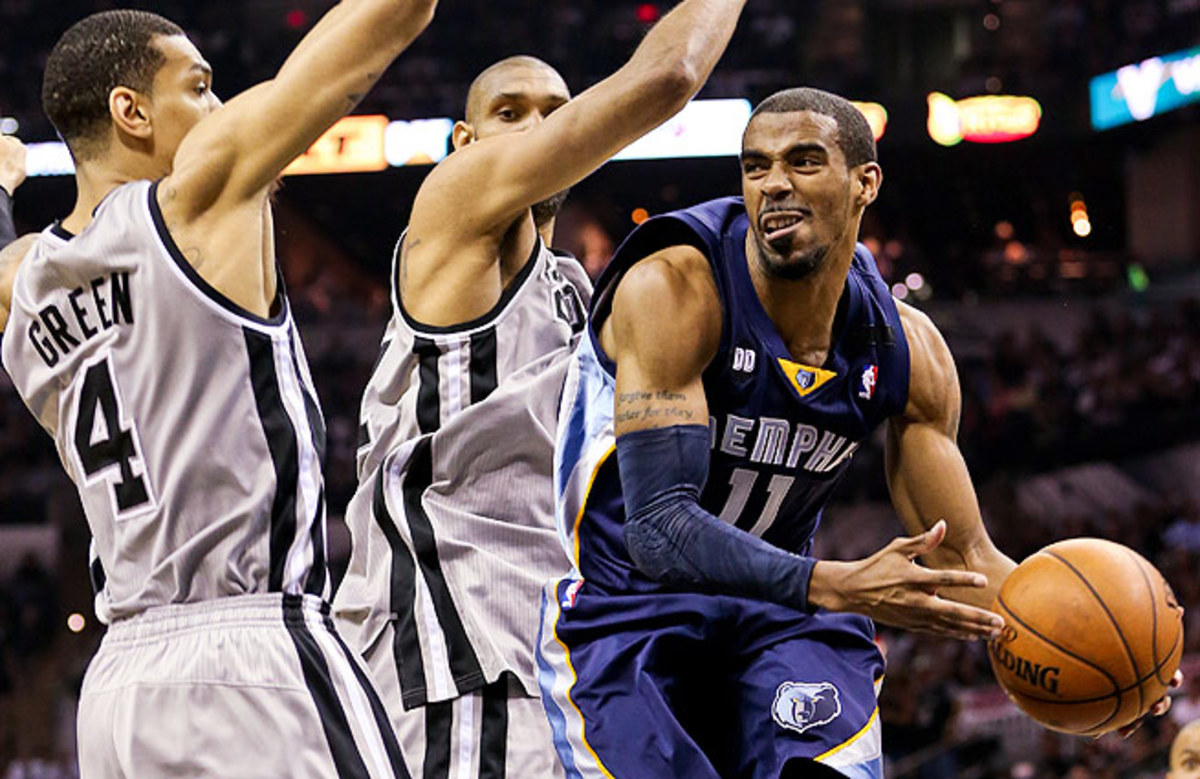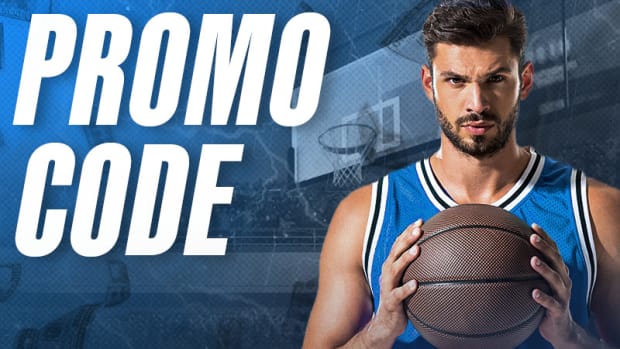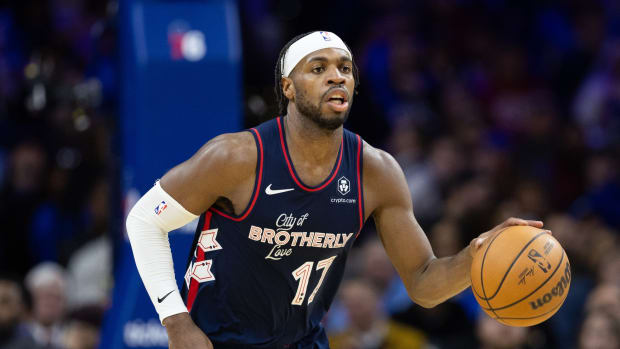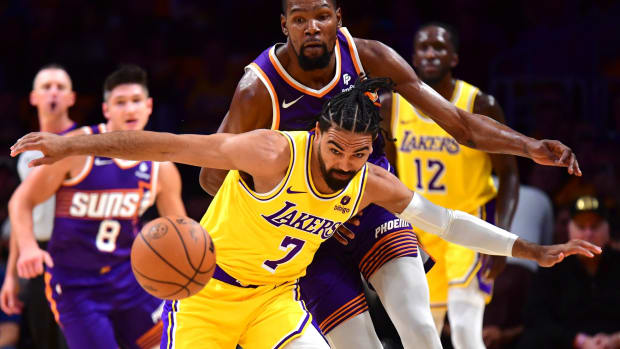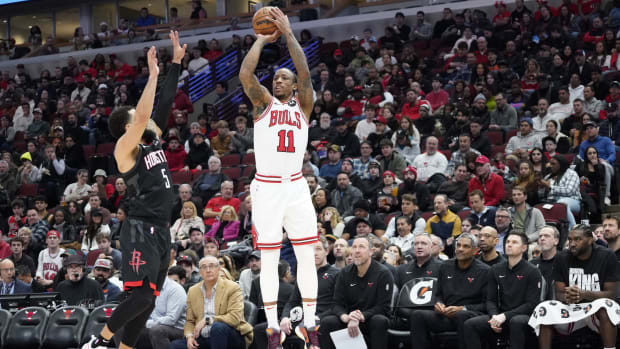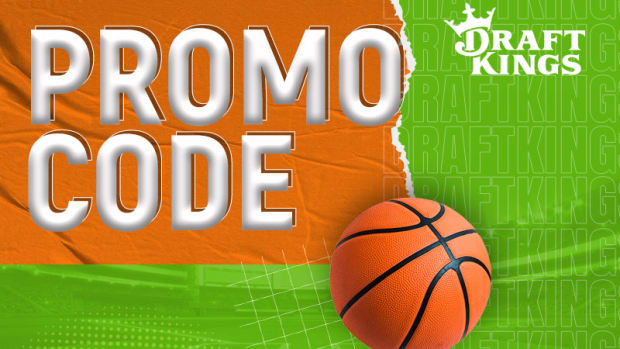Mike Conley finally coming into his own for Memphis Grizzlies
When the shot clock was running low and the big men were taken away, Rudy Gay was always there. Mike Conley could hand him the ball, take a step back and watch him create something from nothing. It wasn't often ideal -- usually a mid-range pull-up jumper -- but it was better than a three-second violation or a tipped entry pass. Conley came to depend on Gay, like a 6-foot-8 security blanket, willing to go one-on-one and rise over a defender in a way Conley never would.
Memphis pulled the blanket on Jan. 31, sending Gay to Toronto in a three-way trade that pared salary and netted small forward Tayshaun Prince. The Grizzlies were criticized even by their head coach -- "When you have champagne taste," Lionel Hollins cracked, "you can't be on a beer budget" -- but the move was not motivated solely by money. The club's restructured front office, installed by 35-year-old owner Robert Pera, wanted to make a bet on Conley. Without Gay, they gambled, their understated point guard would not defer any longer. He'd have no choice but to keep the ball, and in doing so, he might unlock his potential and theirs.
When the Grizzlies shocked the Spurs in the first round of the 2011 playoffs, they were endearing upstarts, but not necessarily viable contenders. On the night they clinched, Conley only logged 25 minutes and backup Greivis Vasquez outscored him in 23, bringing up old questions about whether he was worth the five-year $40 million contract they paid him.
GOLLIVER: Spurs rely on familiar cast in Game 2 victory
In today's NBA, a premier point guard is a virtual requirement, and no one really knew if Conley fit the category. Unlike most modern teams, who feature their floor generals, Memphis runs its offense through Randolph and Gasol. Conley's main job was to bring the ball up the floor and dump it inside. His talents remained hidden. In the first half of this season, Gay led the Grizzlies in scoring; Conley ranked fourth.
On the day of the deal, Conley launched a season-high 19 shots at Oklahoma City, but Memphis lost. The Grizzlies dropped three of their first four games without Gay and Conley called a locker-room meeting. "This is who we've got," he said. "We don't have superstars. We have to be the hardest-working team in the league." Gay wasn't around to bail him out anymore, so with the help of assistant coach Henry Bibby, he studied video of the Spurs' Tony Parker and the Clippers' Chris Paul, examining how they sustain their dribble to probe defenses. In the second half of the season, Conley led the Grizzlies in scoring, averaging nearly four more points per game.
Memphis still played inside-out, and at times, Conley missed Gay when the shot clock was running down. But he didn't have so many mouths to feed, which allowed him to finally feed himself. Conley is the Grizzlies most prolific three-point shooter and their best driver, an ambidextrous ball handler who can finish with a variety of clever floaters and reverse lay-ups. "I got a chance to show the world I can do the same thing as those other great point guards," Conley said.
In high school and college, he was in the shadow of his friend and 7-foot center, Greg Oden. In Memphis, he was obscured by Randolph, Gasol and Gay. I spent a week around the Grizzlies for a story in last week's magazine and Conley's influence is obvious. They are an emotional and expressive group, particularly Tony Allen and Randolph, but Conley steadies them. There are moments when Allen and Randolph look like they might lose control until Conley walks over, addressing them in his quiet way.
The Grizzlies trail the Spurs in the Western Conference finals 2-0, and they've fallen behind the same way they did against the Clippers in the first round: overwhelmed in Game 1, nipped in Game 2. They won the next four against the Clippers, but even if they can't repeat that against the Spurs, this series should propel them forward. When the front office exiled Gay, they did so with the belief that Conley and Gasol could grow into their version of Parker and Duncan, a lofty but admirable goal.
At 25, Conley's guile in the paint is reminiscent of Parker's. Gasol's devotion to the fundamentals recalls Duncan's. Conley and Gasol are trying to learn from them while trying to beat them. Maybe they spring another unforgettable comeback, or maybe their surge ends here. For Conley, the experience remains invaluable, because he is creating it himself.






























